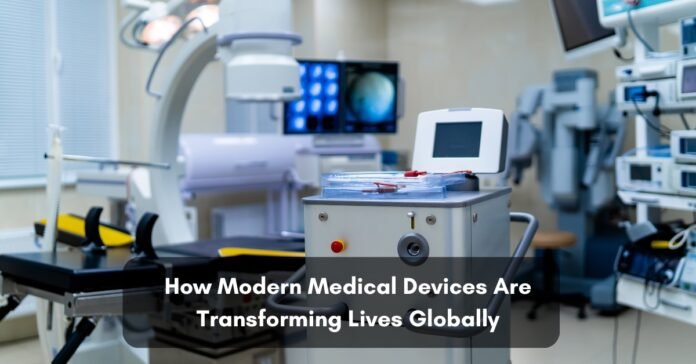 Modern medical devices are revolutionizing the way we diagnose, treat, and manage health conditions. With advancements such as wearable technology and sophisticated diagnostic tools, healthcare is becoming more accessible and efficient for people around the world. Let’s delve into how these devices are making a tangible difference in our lives and shaping the future of healthcare.
Modern medical devices are revolutionizing the way we diagnose, treat, and manage health conditions. With advancements such as wearable technology and sophisticated diagnostic tools, healthcare is becoming more accessible and efficient for people around the world. Let’s delve into how these devices are making a tangible difference in our lives and shaping the future of healthcare.
The Evolution of Medical Devices: From Basic Tools to Advanced Technologies
Medical devices have undergone significant evolution. While a stethoscope or thermometer might have once represented the height of medical innovation, today’s devices can detect diseases at their earliest stages, remotely monitor chronic conditions, and restore mobility through advanced prosthetics.
Portable medical devices empower doctors and patients to perform critical tasks from virtually anywhere. Whether it’s tracking heart rhythms with a smartwatch or utilizing a portable ultrasound, these innovations ensure that healthcare is no longer confined to clinical settings.
Types of Modern Medical Devices Transforming Lives Today
a. Wearable Medical Devices
Wearable medical devices exemplify the integration of technology into our daily lives. From simple fitness trackers to advanced heart rate monitors, these devices allow individuals to monitor their health in real time.
They have evolved from basic step counters to sophisticated tools that track sleep patterns, blood oxygen levels, and even predict heart attacks.
For those with chronic conditions, these remote monitoring devices offer reassurance, enabling healthcare providers to oversee their health without frequent hospital visits.
b. Advanced Prosthetics and Implants
Few innovations have been as transformative as advanced prosthetics and implants. These devices offer individuals with disabilities or injuries a renewed sense of independence.
From bionic limbs that replicate natural movement to cochlear implants that restore hearing, these medical innovations significantly enhance quality of life worldwide.
In countries like India, specialized prosthetics manufacturers create tailored solutions to meet individual needs, ensuring that advancements in this field remain intuitive, durable, and accessible.
c. Diagnostic and Imaging Tools
Modern diagnostic tools, such as MRI machines and CT scanners, are crucial for early disease detection, leading to improved treatment outcomes.
The next generation of smart healthcare devices is further enhancing diagnostics. Portable diagnostic devices allow healthcare professionals to conduct advanced imaging at the patient’s bedside or in remote areas, providing essential diagnoses when access to care is critical.
d. Life-Saving Devices
In emergencies, life-saving equipment like defibrillators and ventilators plays a vital role in stabilizing patients. With technological advancements, these devices are becoming more efficient, portable, and user-friendly.
For example, automated external defibrillators (AEDs) are now widely available in public spaces, enabling bystanders to assist during cardiac emergencies before professional help arrives.
Enhancing Global Healthcare Access
One of the most significant advantages of modern medical devices is their ability to extend healthcare services to underserved and remote populations. In many areas, traditional healthcare infrastructure is limited.
Portable medical devices, telemedicine platforms, and digital health technologies are bridging this gap, allowing healthcare services to be delivered anywhere with an internet connection.
These tools are particularly beneficial in developing countries where healthcare resources may be scarce, enabling providers to monitor patients without requiring extensive travel.
The Role of AI and IoT in Medical Device Innovation
Artificial intelligence (AI) and the Internet of Things (IoT) are transforming healthcare approaches. The integration of AI in medical devices has led to breakthroughs in disease prediction, diagnostics, and personalized treatment.
AI-powered devices analyze vast amounts of data quickly, helping doctors make informed decisions more efficiently. Meanwhile, IoT facilitates seamless communication between smart healthcare devices and healthcare systems.
For instance, a patient’s wearable device can transmit real-time data to their doctor, enabling timely adjustments to treatment plans. This paves the way for a more proactive, personalized approach to healthcare.
Success Stories: Real-World Impact of Medical Devices
The success of modern medical devices is best illustrated through their real-world impacts. Continuous glucose monitors, for example, empower diabetic patients to manage their blood sugar levels in real time, resulting in better health outcomes and enhanced quality of life.
Similarly, bionic limbs are enabling amputees to regain mobility, responding to neural signals for improved functionality. These innovations profoundly change lives, granting individuals freedom and independence they once thought unattainable.
The Future of Medical Devices: What Lies Ahead?
Looking to the future, the potential for innovation in medical technology is limitless. We can anticipate increasingly sophisticated smart healthcare devices that incorporate AI, machine learning, and IoT to provide personalized care.
Devices will likely become smaller, more powerful, and more affordable, making them accessible to a broader population. Trends in medical devices for 2024 will probably emphasize preventive healthcare, focusing on tools that predict and prevent health issues before they escalate.
Whether through wearable devices monitoring vital signs or portable tools providing instant diagnostics, the future of healthcare will be proactive and centered around patient needs.
Transforming Healthcare, One Device at a Time
Modern medical devices have undeniably transformed healthcare in ways once thought impossible. From life-saving equipment to wearable technologies that assist daily health management, these innovations are changing lives around the globe. As technology continues to evolve, so too will the capabilities of these devices, ensuring broader access to high-quality healthcare.
We are only beginning to explore the potential of medical technology. The future looks promising—and healthier—thanks to modern medical devices that are reshaping how we live and thrive.

